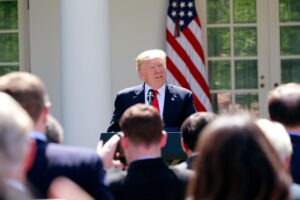In an age dominated by social media and instant communication, news spreads faster than ever, leading to a constant flow of information, both factual and sensational. Some stories grab headlines, spark debates, and ignite outrage, leading to a wave of public discourse that shapes opinions and policies. This article explores some of the most controversial viral news stories that shocked the world, diving into their impacts, the societal responses they elicited, and the implications for journalism and media ethics.
1. The 2016 U.S. Presidential Election
The 2016 U.S. Presidential Election remains one of the most contentious moments in contemporary history. Donald Trump’s unexpected victory over Hillary Clinton not only shocked many but also sparked a wave of controversies surrounding election interference, fake news, and the role of social media. The revelations about Russian interference, particularly through social media platforms like Facebook and Twitter, raised questions about the integrity of democratic processes. The term “fake news” gained prominence, with discussions around misinformation, media bias, and the responsibility of social media companies in curbing the spread of false information.
2. The Death of George Floyd
The death of George Floyd in May 2020 ignited global protests against racial injustice and police brutality. Footage of Floyd’s arrest, in which a Minneapolis police officer knelt on his neck for over nine minutes, went viral, provoking outrage worldwide. This incident became a rallying point for the Black Lives Matter movement, leading to widespread protests, discussions about systemic racism, and calls for police reform. The incident not only highlighted racial disparities but also sparked conversations about the representation of Black voices in media and the responsibility of journalists to report on such issues comprehensively.
3. The COVID-19 Pandemic
The outbreak of COVID-19 in late 2019 and its subsequent spread in 2020 was a watershed moment that shocked the world. As the virus rapidly spread, misinformation about its origins, transmission, and treatment proliferated. Social media became a battleground for debates on public health measures, mask mandates, and vaccine efficacy. The controversy over how different countries handled the pandemic and the subsequent impact on global economies and mental health led to heated discussions. The pandemic underscored the vital role of accurate journalism in times of crisis, as well as the consequences of misinformation.
4. The MeToo Movement

The MeToo movement, which gained momentum in late 2017, sparked a global conversation about sexual harassment and assault. Beginning with allegations against Hollywood mogul Harvey Weinstein, the movement encouraged countless individuals to share their experiences of abuse, leading to a cultural reckoning. This viral phenomenon led to widespread media coverage and discussions about power dynamics, gender inequality, and accountability in various industries. However, it also faced backlash, with debates over due process, false allegations, and the impact on men accused of harassment, highlighting the complexities of such social movements.
5. The Capitol Riot of January 6, 2021
The attack on the U.S. Capitol on January 6, 2021, by supporters of then-President Donald Trump was a shocking event that captivated the world. The storming of the Capitol during the certification of the Electoral College results resulted in deaths, injuries, and extensive damage. The event raised urgent questions about extremism, the role of social media in inciting violence, and the effectiveness of law enforcement in protecting democratic institutions. The fallout led to numerous arrests, discussions about domestic terrorism, and significant political ramifications, including the second impeachment of Trump.
6. The Syrian Refugee Crisis
The Syrian civil war, which began in 2011, created one of the largest refugee crises in modern history. As millions fled violence and persecution, the plight of Syrian refugees became a controversial topic worldwide. News stories depicting desperate families attempting to cross borders and the harrowing conditions in refugee camps sparked debates over immigration policies, humanitarian aid, and national security. Images of drowned children, such as Alan Kurdi, brought the crisis into public consciousness, compelling many to advocate for more compassionate immigration policies. The media’s portrayal of refugees, often oscillating between sympathy and fear, reflects the complexities of this humanitarian crisis.
7. The Paris Climate Agreement Withdrawal

In 2017, President Donald Trump announced the United States‘ withdrawal from the Paris Climate Agreement, a landmark international treaty aimed at combating climate change. This decision sparked outrage among environmentalists, world leaders, and scientists. The move was widely criticized for undermining global efforts to address climate change and protect the planet for future generations. The controversy surrounding the withdrawal highlighted the ongoing debates about climate change, economic growth, and the responsibilities of developed nations versus developing ones. It also prompted increased activism and mobilization within the environmental movement, demonstrating the power of public pressure in influencing policy.
8. The Release of the Afghanistan Papers
In December 2019, the Washington Post published a trove of documents known as the Afghanistan Papers, revealing the U.S. government’s misleading statements about the war in Afghanistan over nearly two decades. The documents disclosed how officials were aware that the war was unwinnable yet continued to present an optimistic narrative to the public. The revelations reignited debates about the U.S. foreign policy, military spending, and the cost of war. The Afghanistan Papers also highlighted the media’s role in holding government accountable and the importance of transparency in maintaining public trust.
9. The Rise of Conspiracy Theories
The rise of conspiracy theories, particularly during the COVID-19 pandemic, has become a major issue in global discourse. Theories suggesting that the virus was created in a lab, or that it was a hoax, proliferated on social media platforms, leading to real-world consequences. The spread of misinformation about vaccines and public health measures contributed to vaccine hesitancy, posing challenges for public health officials. The controversy surrounding conspiracy theories raises questions about the responsibility of social media companies, the impact of algorithm-driven content, and the need for media literacy to combat misinformation effectively.
10. The Black Lives Matter Protests in the UK

Following the death of George Floyd, protests erupted not only in the U.S. but also in the UK, focusing on issues of systemic racism and police brutality within the British context. The protests were marked by calls to remove statues of controversial figures linked to colonialism and slavery, leading to heated debates about historical memory and accountability. The viral nature of the protests and the conversations they sparked about race, privilege, and identity politics prompted a broader reckoning with Britain’s colonial past. This controversy demonstrated the interconnectedness of global movements for justice and the importance of examining history through critical lenses.
Conclusion
These controversial viral news stories reflect the turbulent nature of contemporary society, where information spreads rapidly and has far-reaching consequences. From political upheavals and social movements to humanitarian crises and ethical dilemmas, each story has left an indelible mark on public consciousness. The interplay between media, technology, and society continues to shape our understanding of these events, highlighting the vital role of responsible










Leave a Reply